ACC620 Contemporary Issues in Accounting: Research Proposal Analysis
VerifiedAdded on 2023/06/09
|18
|2972
|132
Report
AI Summary
This report is a research proposal exploring contemporary issues in accounting, specifically focusing on Corporate Social Responsibility (CSR) practices and their impact on business performance. The research delves into the application of various theoretical frameworks, including legitimacy theory, stakeholder theory, and institutional theory, to understand CSR motivations and outcomes. The proposal addresses the practical motivation behind the research, highlighting the increasing emphasis on corporate responsibilities and the relationship between CSR and financial performance, customer satisfaction, and competitive advantage. The literature review provides a comprehensive overview of CSR, its definitions, components, and significance in businesses, including its economic, legal, ethical, and discretionary aspects. The methodology outlines the theoretical framework of analysis. The report examines various theories linked to CSR, such as the legitimacy theory, stakeholder theory, and institutional theory, and how they can be applied in business practices. The research aims to provide a detailed analysis of CSR practices and their implications in the current market scenario.
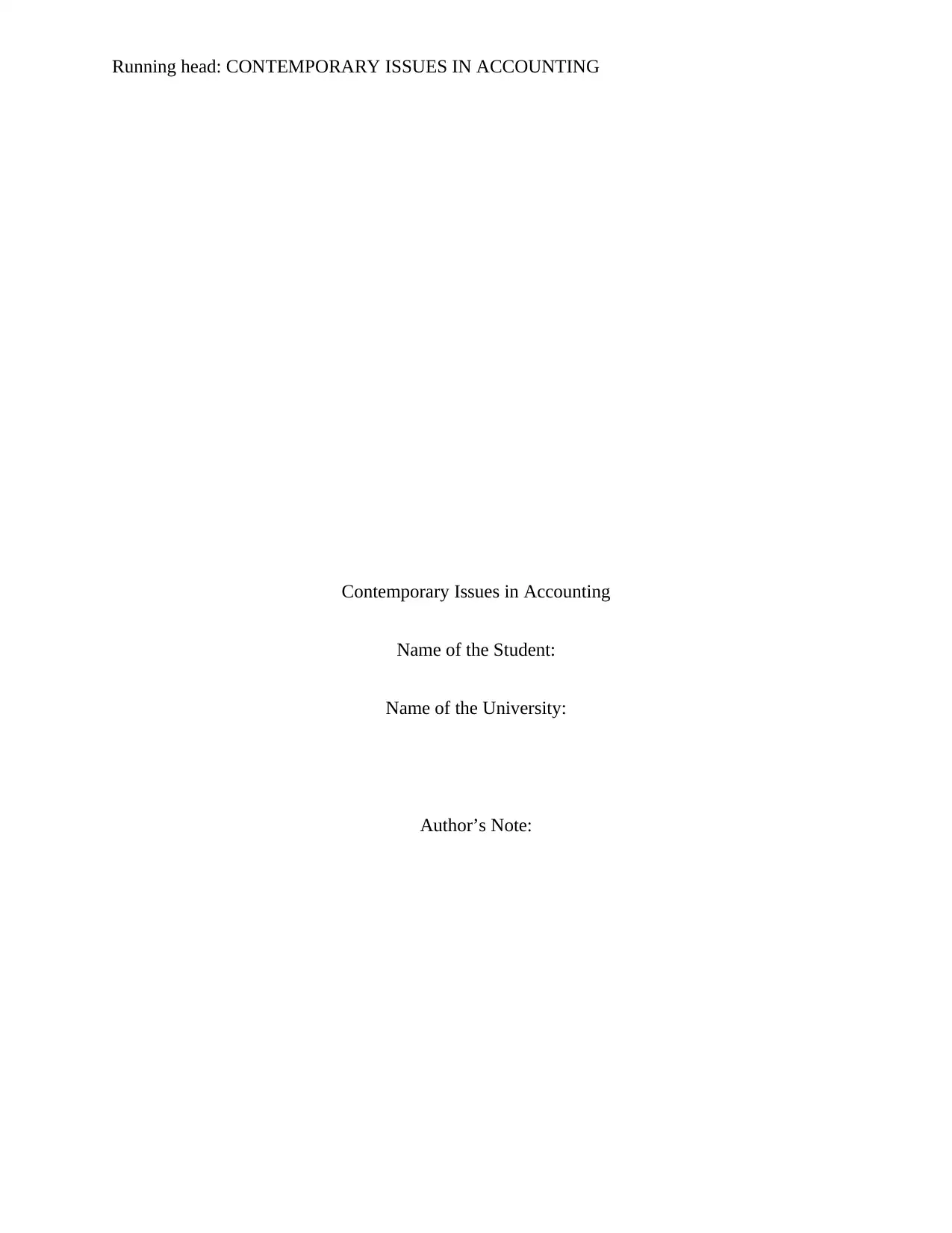
Running head: CONTEMPORARY ISSUES IN ACCOUNTING
Contemporary Issues in Accounting
Name of the Student:
Name of the University:
Author’s Note:
Contemporary Issues in Accounting
Name of the Student:
Name of the University:
Author’s Note:
Paraphrase This Document
Need a fresh take? Get an instant paraphrase of this document with our AI Paraphraser
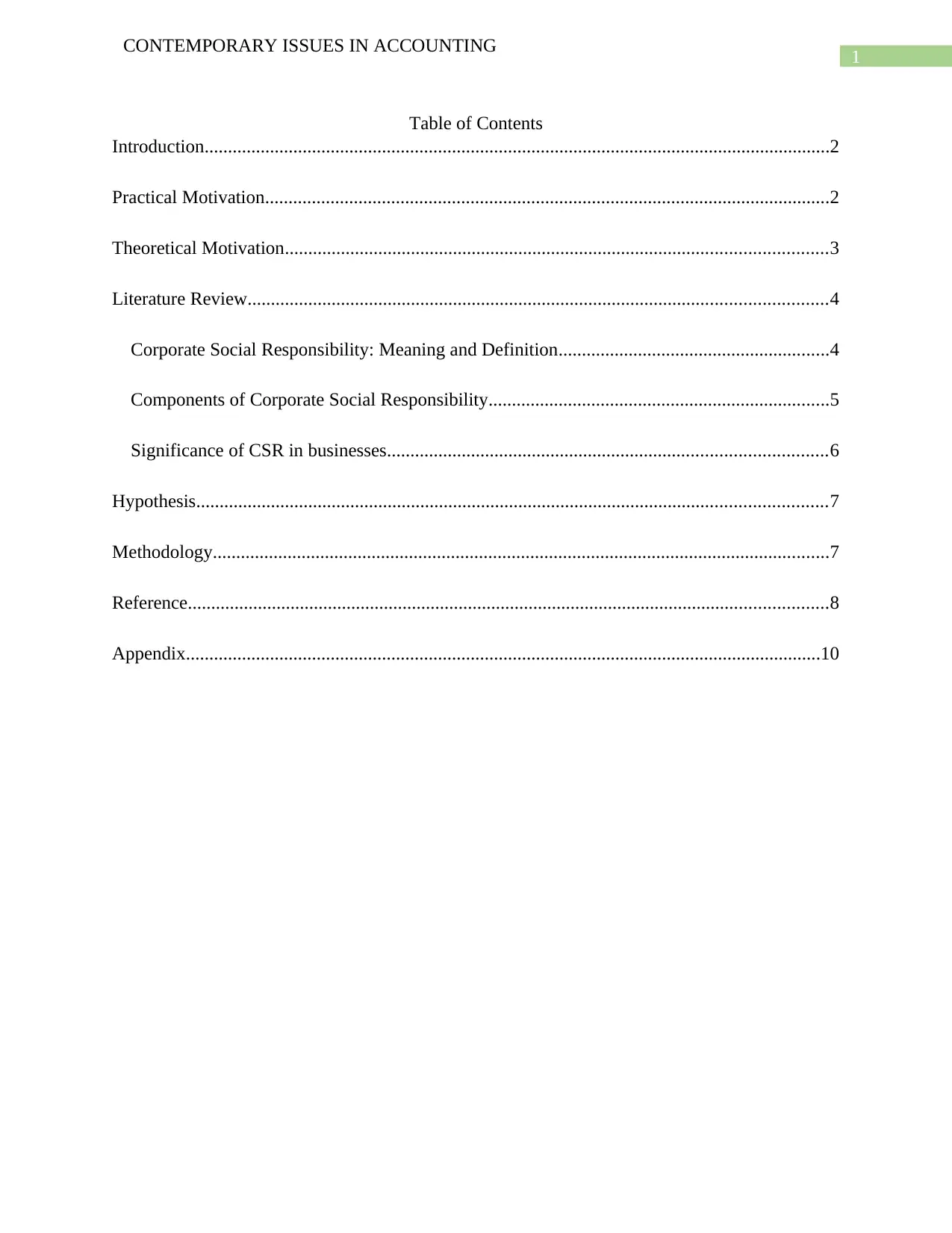
1
CONTEMPORARY ISSUES IN ACCOUNTING
Table of Contents
Introduction......................................................................................................................................2
Practical Motivation.........................................................................................................................2
Theoretical Motivation....................................................................................................................3
Literature Review............................................................................................................................4
Corporate Social Responsibility: Meaning and Definition..........................................................4
Components of Corporate Social Responsibility.........................................................................5
Significance of CSR in businesses..............................................................................................6
Hypothesis.......................................................................................................................................7
Methodology....................................................................................................................................7
Reference.........................................................................................................................................8
Appendix........................................................................................................................................10
CONTEMPORARY ISSUES IN ACCOUNTING
Table of Contents
Introduction......................................................................................................................................2
Practical Motivation.........................................................................................................................2
Theoretical Motivation....................................................................................................................3
Literature Review............................................................................................................................4
Corporate Social Responsibility: Meaning and Definition..........................................................4
Components of Corporate Social Responsibility.........................................................................5
Significance of CSR in businesses..............................................................................................6
Hypothesis.......................................................................................................................................7
Methodology....................................................................................................................................7
Reference.........................................................................................................................................8
Appendix........................................................................................................................................10
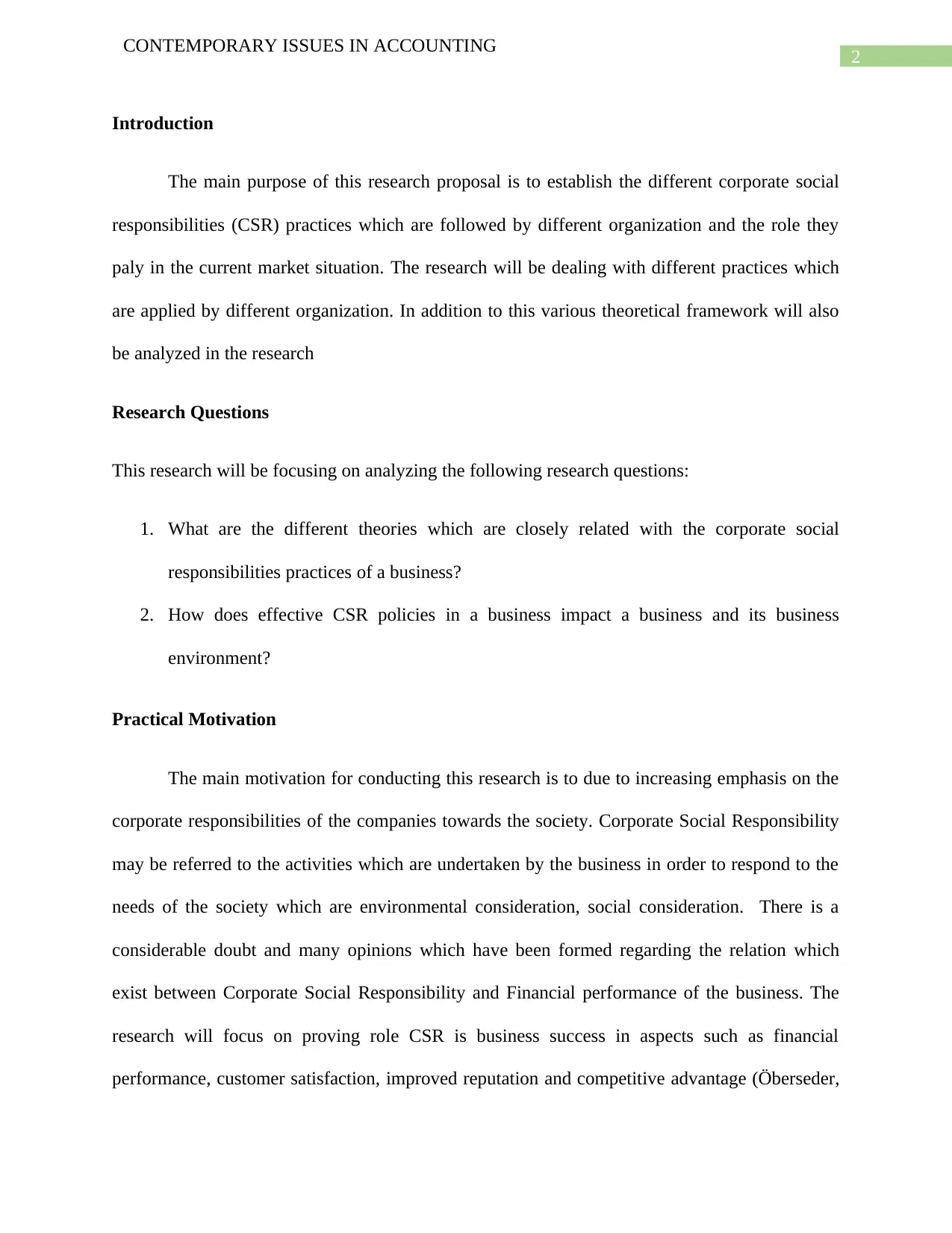
2
CONTEMPORARY ISSUES IN ACCOUNTING
Introduction
The main purpose of this research proposal is to establish the different corporate social
responsibilities (CSR) practices which are followed by different organization and the role they
paly in the current market situation. The research will be dealing with different practices which
are applied by different organization. In addition to this various theoretical framework will also
be analyzed in the research
Research Questions
This research will be focusing on analyzing the following research questions:
1. What are the different theories which are closely related with the corporate social
responsibilities practices of a business?
2. How does effective CSR policies in a business impact a business and its business
environment?
Practical Motivation
The main motivation for conducting this research is to due to increasing emphasis on the
corporate responsibilities of the companies towards the society. Corporate Social Responsibility
may be referred to the activities which are undertaken by the business in order to respond to the
needs of the society which are environmental consideration, social consideration. There is a
considerable doubt and many opinions which have been formed regarding the relation which
exist between Corporate Social Responsibility and Financial performance of the business. The
research will focus on proving role CSR is business success in aspects such as financial
performance, customer satisfaction, improved reputation and competitive advantage (Öberseder,
CONTEMPORARY ISSUES IN ACCOUNTING
Introduction
The main purpose of this research proposal is to establish the different corporate social
responsibilities (CSR) practices which are followed by different organization and the role they
paly in the current market situation. The research will be dealing with different practices which
are applied by different organization. In addition to this various theoretical framework will also
be analyzed in the research
Research Questions
This research will be focusing on analyzing the following research questions:
1. What are the different theories which are closely related with the corporate social
responsibilities practices of a business?
2. How does effective CSR policies in a business impact a business and its business
environment?
Practical Motivation
The main motivation for conducting this research is to due to increasing emphasis on the
corporate responsibilities of the companies towards the society. Corporate Social Responsibility
may be referred to the activities which are undertaken by the business in order to respond to the
needs of the society which are environmental consideration, social consideration. There is a
considerable doubt and many opinions which have been formed regarding the relation which
exist between Corporate Social Responsibility and Financial performance of the business. The
research will focus on proving role CSR is business success in aspects such as financial
performance, customer satisfaction, improved reputation and competitive advantage (Öberseder,
⊘ This is a preview!⊘
Do you want full access?
Subscribe today to unlock all pages.

Trusted by 1+ million students worldwide
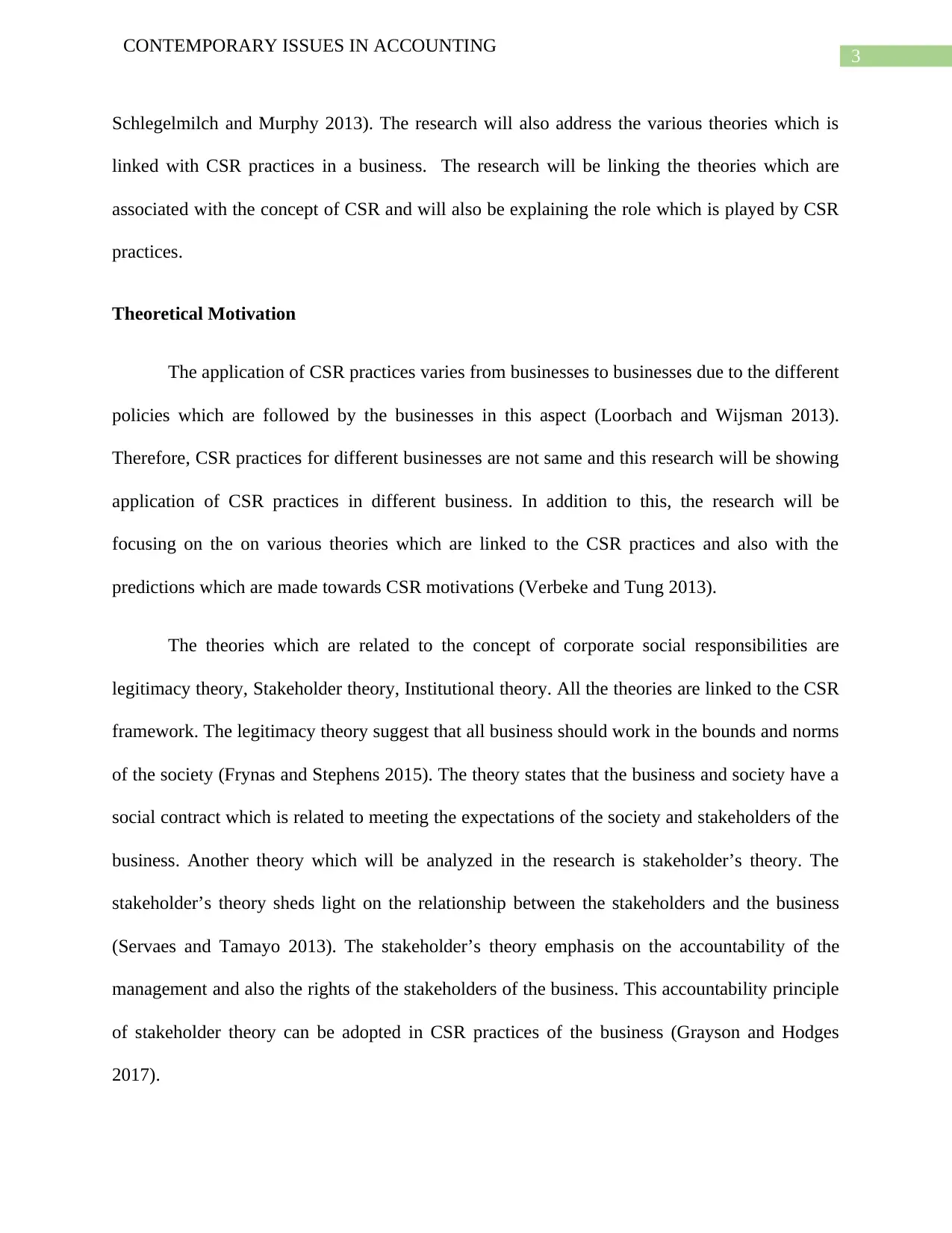
3
CONTEMPORARY ISSUES IN ACCOUNTING
Schlegelmilch and Murphy 2013). The research will also address the various theories which is
linked with CSR practices in a business. The research will be linking the theories which are
associated with the concept of CSR and will also be explaining the role which is played by CSR
practices.
Theoretical Motivation
The application of CSR practices varies from businesses to businesses due to the different
policies which are followed by the businesses in this aspect (Loorbach and Wijsman 2013).
Therefore, CSR practices for different businesses are not same and this research will be showing
application of CSR practices in different business. In addition to this, the research will be
focusing on the on various theories which are linked to the CSR practices and also with the
predictions which are made towards CSR motivations (Verbeke and Tung 2013).
The theories which are related to the concept of corporate social responsibilities are
legitimacy theory, Stakeholder theory, Institutional theory. All the theories are linked to the CSR
framework. The legitimacy theory suggest that all business should work in the bounds and norms
of the society (Frynas and Stephens 2015). The theory states that the business and society have a
social contract which is related to meeting the expectations of the society and stakeholders of the
business. Another theory which will be analyzed in the research is stakeholder’s theory. The
stakeholder’s theory sheds light on the relationship between the stakeholders and the business
(Servaes and Tamayo 2013). The stakeholder’s theory emphasis on the accountability of the
management and also the rights of the stakeholders of the business. This accountability principle
of stakeholder theory can be adopted in CSR practices of the business (Grayson and Hodges
2017).
CONTEMPORARY ISSUES IN ACCOUNTING
Schlegelmilch and Murphy 2013). The research will also address the various theories which is
linked with CSR practices in a business. The research will be linking the theories which are
associated with the concept of CSR and will also be explaining the role which is played by CSR
practices.
Theoretical Motivation
The application of CSR practices varies from businesses to businesses due to the different
policies which are followed by the businesses in this aspect (Loorbach and Wijsman 2013).
Therefore, CSR practices for different businesses are not same and this research will be showing
application of CSR practices in different business. In addition to this, the research will be
focusing on the on various theories which are linked to the CSR practices and also with the
predictions which are made towards CSR motivations (Verbeke and Tung 2013).
The theories which are related to the concept of corporate social responsibilities are
legitimacy theory, Stakeholder theory, Institutional theory. All the theories are linked to the CSR
framework. The legitimacy theory suggest that all business should work in the bounds and norms
of the society (Frynas and Stephens 2015). The theory states that the business and society have a
social contract which is related to meeting the expectations of the society and stakeholders of the
business. Another theory which will be analyzed in the research is stakeholder’s theory. The
stakeholder’s theory sheds light on the relationship between the stakeholders and the business
(Servaes and Tamayo 2013). The stakeholder’s theory emphasis on the accountability of the
management and also the rights of the stakeholders of the business. This accountability principle
of stakeholder theory can be adopted in CSR practices of the business (Grayson and Hodges
2017).
Paraphrase This Document
Need a fresh take? Get an instant paraphrase of this document with our AI Paraphraser
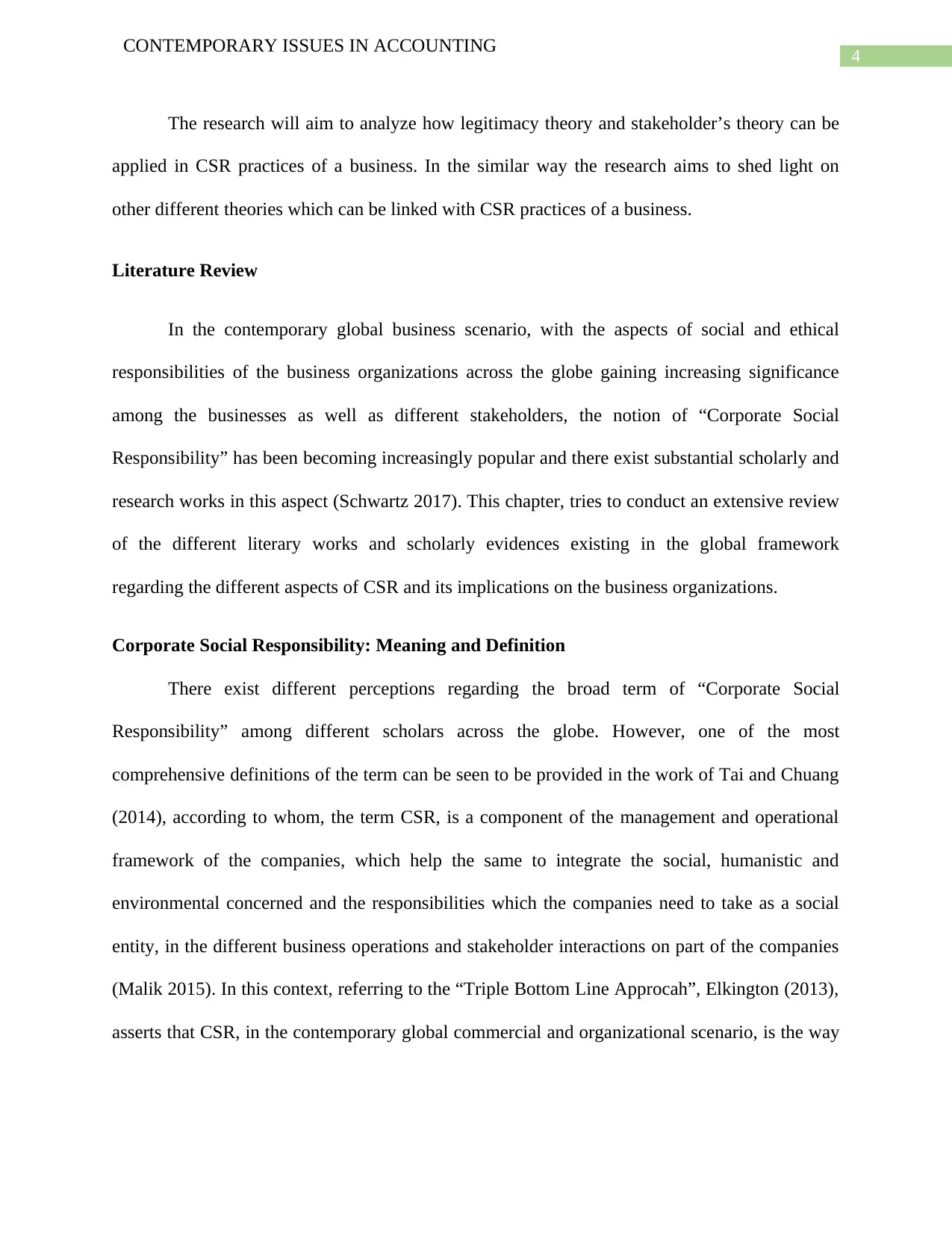
4
CONTEMPORARY ISSUES IN ACCOUNTING
The research will aim to analyze how legitimacy theory and stakeholder’s theory can be
applied in CSR practices of a business. In the similar way the research aims to shed light on
other different theories which can be linked with CSR practices of a business.
Literature Review
In the contemporary global business scenario, with the aspects of social and ethical
responsibilities of the business organizations across the globe gaining increasing significance
among the businesses as well as different stakeholders, the notion of “Corporate Social
Responsibility” has been becoming increasingly popular and there exist substantial scholarly and
research works in this aspect (Schwartz 2017). This chapter, tries to conduct an extensive review
of the different literary works and scholarly evidences existing in the global framework
regarding the different aspects of CSR and its implications on the business organizations.
Corporate Social Responsibility: Meaning and Definition
There exist different perceptions regarding the broad term of “Corporate Social
Responsibility” among different scholars across the globe. However, one of the most
comprehensive definitions of the term can be seen to be provided in the work of Tai and Chuang
(2014), according to whom, the term CSR, is a component of the management and operational
framework of the companies, which help the same to integrate the social, humanistic and
environmental concerned and the responsibilities which the companies need to take as a social
entity, in the different business operations and stakeholder interactions on part of the companies
(Malik 2015). In this context, referring to the “Triple Bottom Line Approcah”, Elkington (2013),
asserts that CSR, in the contemporary global commercial and organizational scenario, is the way
CONTEMPORARY ISSUES IN ACCOUNTING
The research will aim to analyze how legitimacy theory and stakeholder’s theory can be
applied in CSR practices of a business. In the similar way the research aims to shed light on
other different theories which can be linked with CSR practices of a business.
Literature Review
In the contemporary global business scenario, with the aspects of social and ethical
responsibilities of the business organizations across the globe gaining increasing significance
among the businesses as well as different stakeholders, the notion of “Corporate Social
Responsibility” has been becoming increasingly popular and there exist substantial scholarly and
research works in this aspect (Schwartz 2017). This chapter, tries to conduct an extensive review
of the different literary works and scholarly evidences existing in the global framework
regarding the different aspects of CSR and its implications on the business organizations.
Corporate Social Responsibility: Meaning and Definition
There exist different perceptions regarding the broad term of “Corporate Social
Responsibility” among different scholars across the globe. However, one of the most
comprehensive definitions of the term can be seen to be provided in the work of Tai and Chuang
(2014), according to whom, the term CSR, is a component of the management and operational
framework of the companies, which help the same to integrate the social, humanistic and
environmental concerned and the responsibilities which the companies need to take as a social
entity, in the different business operations and stakeholder interactions on part of the companies
(Malik 2015). In this context, referring to the “Triple Bottom Line Approcah”, Elkington (2013),
asserts that CSR, in the contemporary global commercial and organizational scenario, is the way
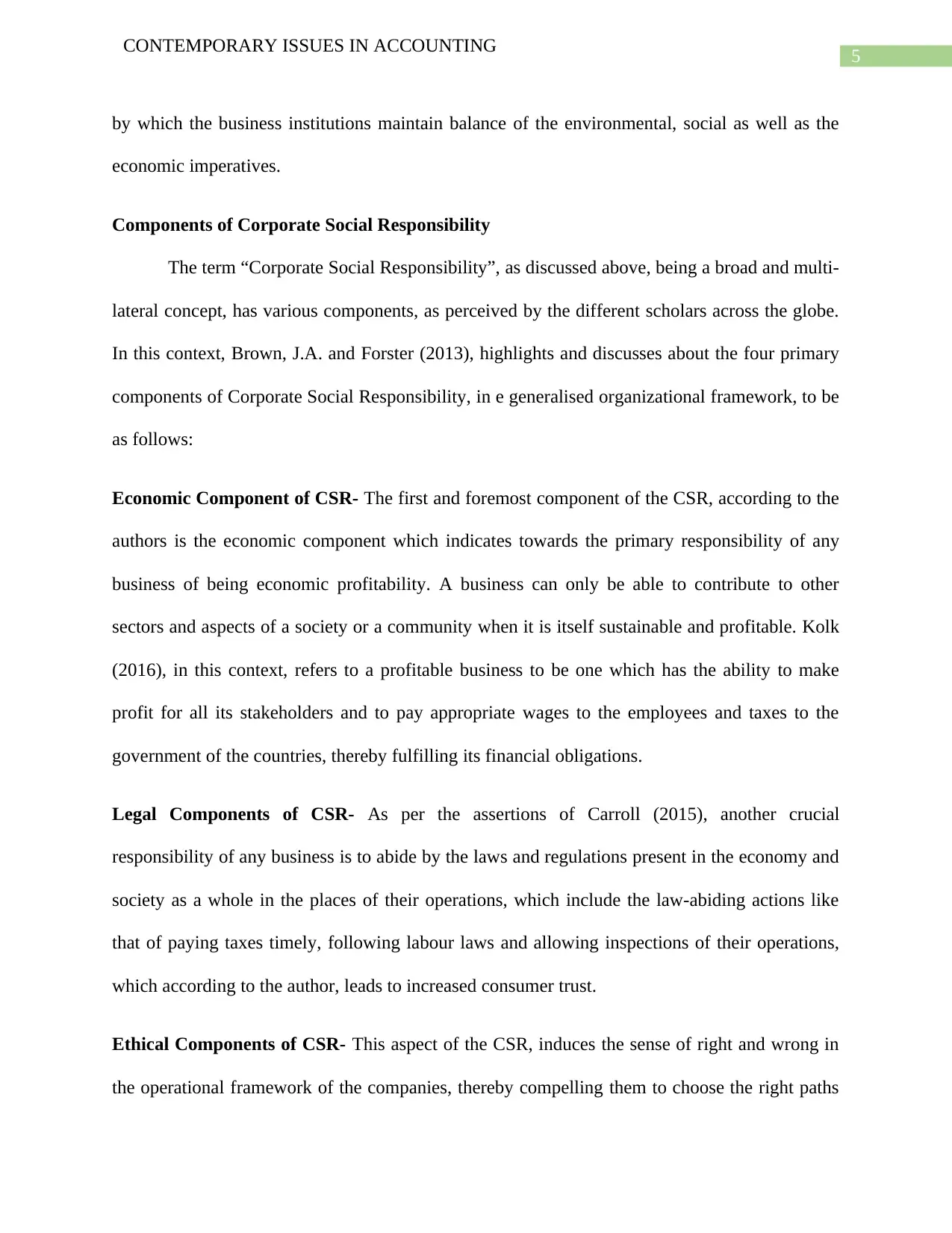
5
CONTEMPORARY ISSUES IN ACCOUNTING
by which the business institutions maintain balance of the environmental, social as well as the
economic imperatives.
Components of Corporate Social Responsibility
The term “Corporate Social Responsibility”, as discussed above, being a broad and multi-
lateral concept, has various components, as perceived by the different scholars across the globe.
In this context, Brown, J.A. and Forster (2013), highlights and discusses about the four primary
components of Corporate Social Responsibility, in e generalised organizational framework, to be
as follows:
Economic Component of CSR- The first and foremost component of the CSR, according to the
authors is the economic component which indicates towards the primary responsibility of any
business of being economic profitability. A business can only be able to contribute to other
sectors and aspects of a society or a community when it is itself sustainable and profitable. Kolk
(2016), in this context, refers to a profitable business to be one which has the ability to make
profit for all its stakeholders and to pay appropriate wages to the employees and taxes to the
government of the countries, thereby fulfilling its financial obligations.
Legal Components of CSR- As per the assertions of Carroll (2015), another crucial
responsibility of any business is to abide by the laws and regulations present in the economy and
society as a whole in the places of their operations, which include the law-abiding actions like
that of paying taxes timely, following labour laws and allowing inspections of their operations,
which according to the author, leads to increased consumer trust.
Ethical Components of CSR- This aspect of the CSR, induces the sense of right and wrong in
the operational framework of the companies, thereby compelling them to choose the right paths
CONTEMPORARY ISSUES IN ACCOUNTING
by which the business institutions maintain balance of the environmental, social as well as the
economic imperatives.
Components of Corporate Social Responsibility
The term “Corporate Social Responsibility”, as discussed above, being a broad and multi-
lateral concept, has various components, as perceived by the different scholars across the globe.
In this context, Brown, J.A. and Forster (2013), highlights and discusses about the four primary
components of Corporate Social Responsibility, in e generalised organizational framework, to be
as follows:
Economic Component of CSR- The first and foremost component of the CSR, according to the
authors is the economic component which indicates towards the primary responsibility of any
business of being economic profitability. A business can only be able to contribute to other
sectors and aspects of a society or a community when it is itself sustainable and profitable. Kolk
(2016), in this context, refers to a profitable business to be one which has the ability to make
profit for all its stakeholders and to pay appropriate wages to the employees and taxes to the
government of the countries, thereby fulfilling its financial obligations.
Legal Components of CSR- As per the assertions of Carroll (2015), another crucial
responsibility of any business is to abide by the laws and regulations present in the economy and
society as a whole in the places of their operations, which include the law-abiding actions like
that of paying taxes timely, following labour laws and allowing inspections of their operations,
which according to the author, leads to increased consumer trust.
Ethical Components of CSR- This aspect of the CSR, induces the sense of right and wrong in
the operational framework of the companies, thereby compelling them to choose the right paths
⊘ This is a preview!⊘
Do you want full access?
Subscribe today to unlock all pages.

Trusted by 1+ million students worldwide
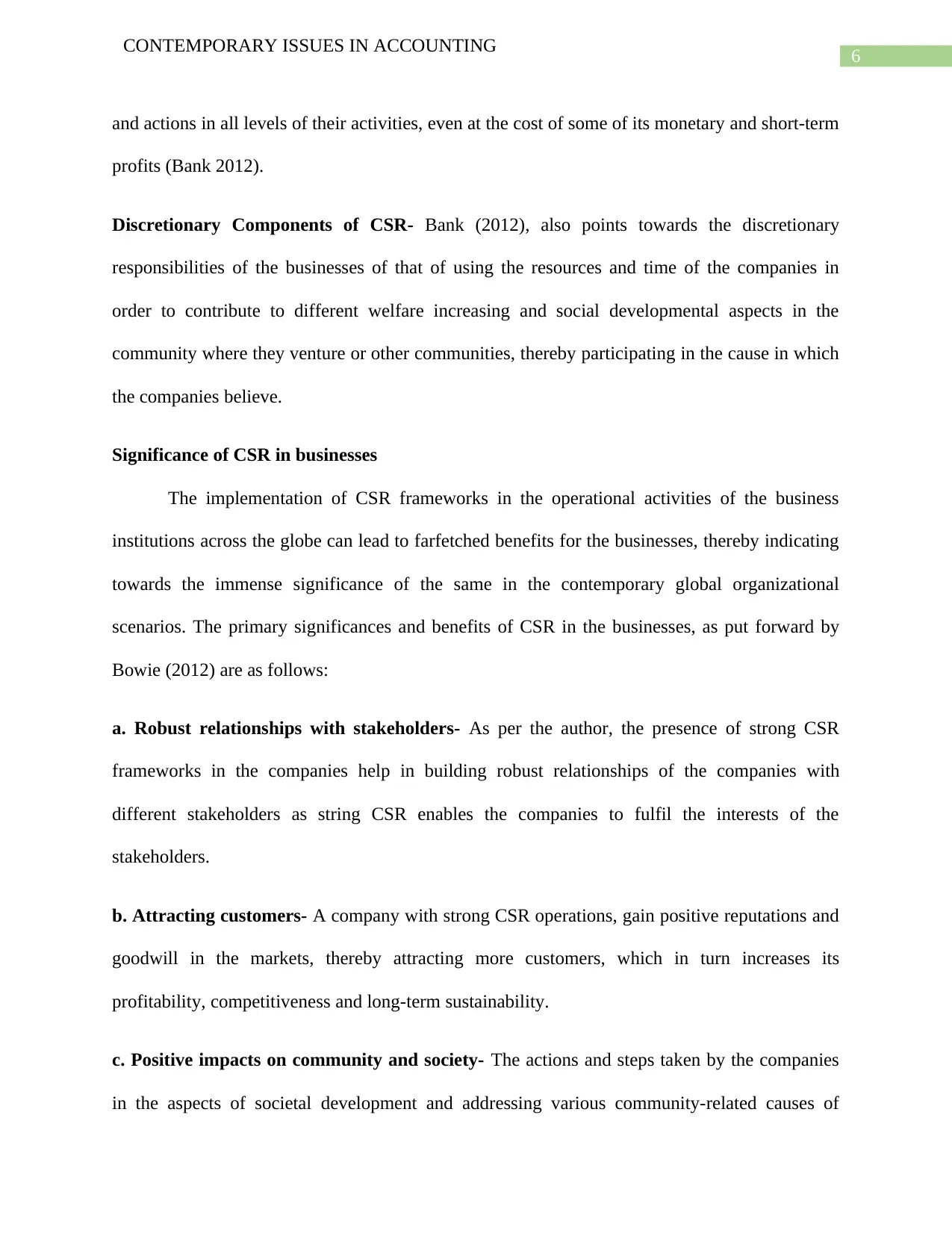
6
CONTEMPORARY ISSUES IN ACCOUNTING
and actions in all levels of their activities, even at the cost of some of its monetary and short-term
profits (Bank 2012).
Discretionary Components of CSR- Bank (2012), also points towards the discretionary
responsibilities of the businesses of that of using the resources and time of the companies in
order to contribute to different welfare increasing and social developmental aspects in the
community where they venture or other communities, thereby participating in the cause in which
the companies believe.
Significance of CSR in businesses
The implementation of CSR frameworks in the operational activities of the business
institutions across the globe can lead to farfetched benefits for the businesses, thereby indicating
towards the immense significance of the same in the contemporary global organizational
scenarios. The primary significances and benefits of CSR in the businesses, as put forward by
Bowie (2012) are as follows:
a. Robust relationships with stakeholders- As per the author, the presence of strong CSR
frameworks in the companies help in building robust relationships of the companies with
different stakeholders as string CSR enables the companies to fulfil the interests of the
stakeholders.
b. Attracting customers- A company with strong CSR operations, gain positive reputations and
goodwill in the markets, thereby attracting more customers, which in turn increases its
profitability, competitiveness and long-term sustainability.
c. Positive impacts on community and society- The actions and steps taken by the companies
in the aspects of societal development and addressing various community-related causes of
CONTEMPORARY ISSUES IN ACCOUNTING
and actions in all levels of their activities, even at the cost of some of its monetary and short-term
profits (Bank 2012).
Discretionary Components of CSR- Bank (2012), also points towards the discretionary
responsibilities of the businesses of that of using the resources and time of the companies in
order to contribute to different welfare increasing and social developmental aspects in the
community where they venture or other communities, thereby participating in the cause in which
the companies believe.
Significance of CSR in businesses
The implementation of CSR frameworks in the operational activities of the business
institutions across the globe can lead to farfetched benefits for the businesses, thereby indicating
towards the immense significance of the same in the contemporary global organizational
scenarios. The primary significances and benefits of CSR in the businesses, as put forward by
Bowie (2012) are as follows:
a. Robust relationships with stakeholders- As per the author, the presence of strong CSR
frameworks in the companies help in building robust relationships of the companies with
different stakeholders as string CSR enables the companies to fulfil the interests of the
stakeholders.
b. Attracting customers- A company with strong CSR operations, gain positive reputations and
goodwill in the markets, thereby attracting more customers, which in turn increases its
profitability, competitiveness and long-term sustainability.
c. Positive impacts on community and society- The actions and steps taken by the companies
in the aspects of societal development and addressing various community-related causes of
Paraphrase This Document
Need a fresh take? Get an instant paraphrase of this document with our AI Paraphraser
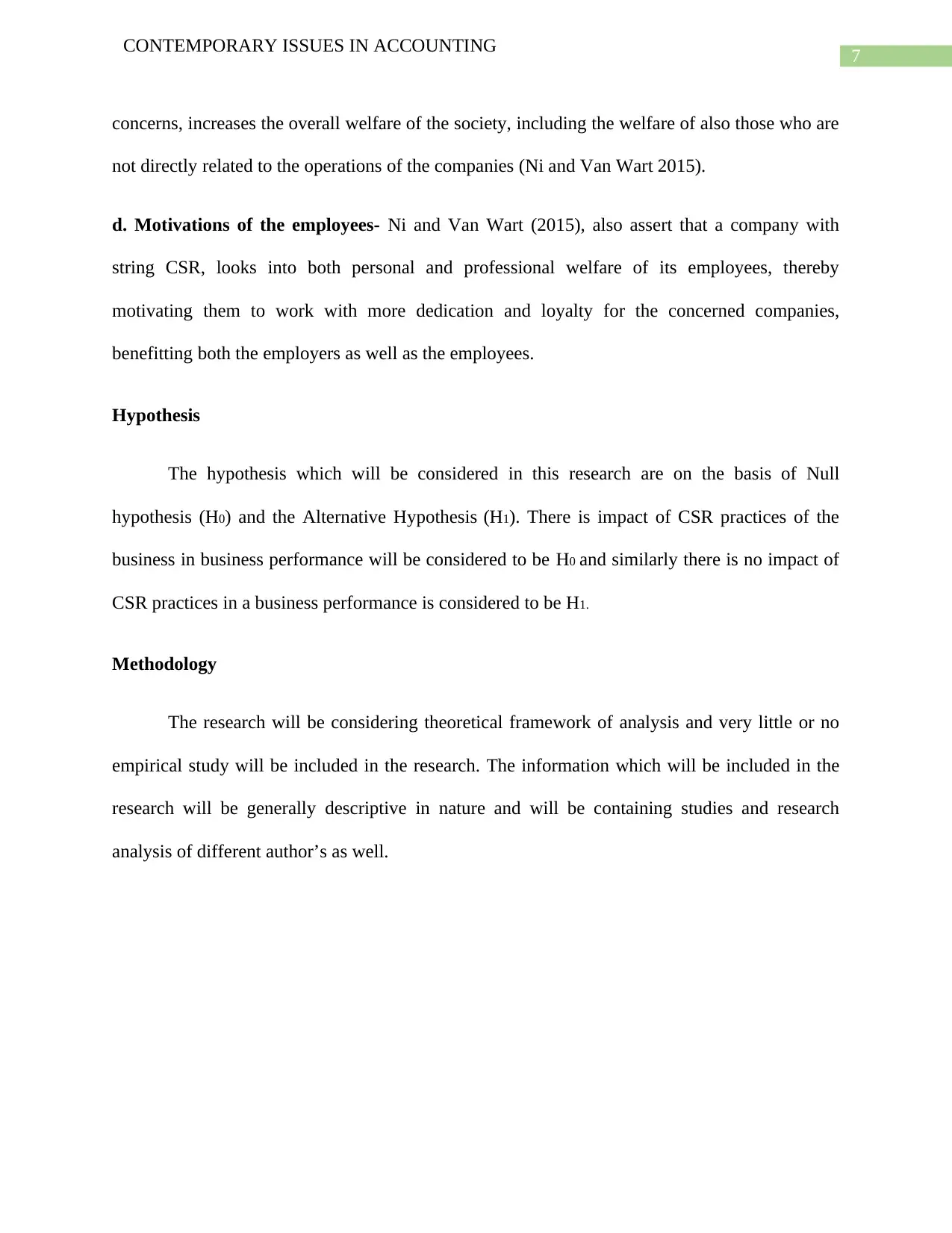
7
CONTEMPORARY ISSUES IN ACCOUNTING
concerns, increases the overall welfare of the society, including the welfare of also those who are
not directly related to the operations of the companies (Ni and Van Wart 2015).
d. Motivations of the employees- Ni and Van Wart (2015), also assert that a company with
string CSR, looks into both personal and professional welfare of its employees, thereby
motivating them to work with more dedication and loyalty for the concerned companies,
benefitting both the employers as well as the employees.
Hypothesis
The hypothesis which will be considered in this research are on the basis of Null
hypothesis (H0) and the Alternative Hypothesis (H1). There is impact of CSR practices of the
business in business performance will be considered to be H0 and similarly there is no impact of
CSR practices in a business performance is considered to be H1.
Methodology
The research will be considering theoretical framework of analysis and very little or no
empirical study will be included in the research. The information which will be included in the
research will be generally descriptive in nature and will be containing studies and research
analysis of different author’s as well.
CONTEMPORARY ISSUES IN ACCOUNTING
concerns, increases the overall welfare of the society, including the welfare of also those who are
not directly related to the operations of the companies (Ni and Van Wart 2015).
d. Motivations of the employees- Ni and Van Wart (2015), also assert that a company with
string CSR, looks into both personal and professional welfare of its employees, thereby
motivating them to work with more dedication and loyalty for the concerned companies,
benefitting both the employers as well as the employees.
Hypothesis
The hypothesis which will be considered in this research are on the basis of Null
hypothesis (H0) and the Alternative Hypothesis (H1). There is impact of CSR practices of the
business in business performance will be considered to be H0 and similarly there is no impact of
CSR practices in a business performance is considered to be H1.
Methodology
The research will be considering theoretical framework of analysis and very little or no
empirical study will be included in the research. The information which will be included in the
research will be generally descriptive in nature and will be containing studies and research
analysis of different author’s as well.
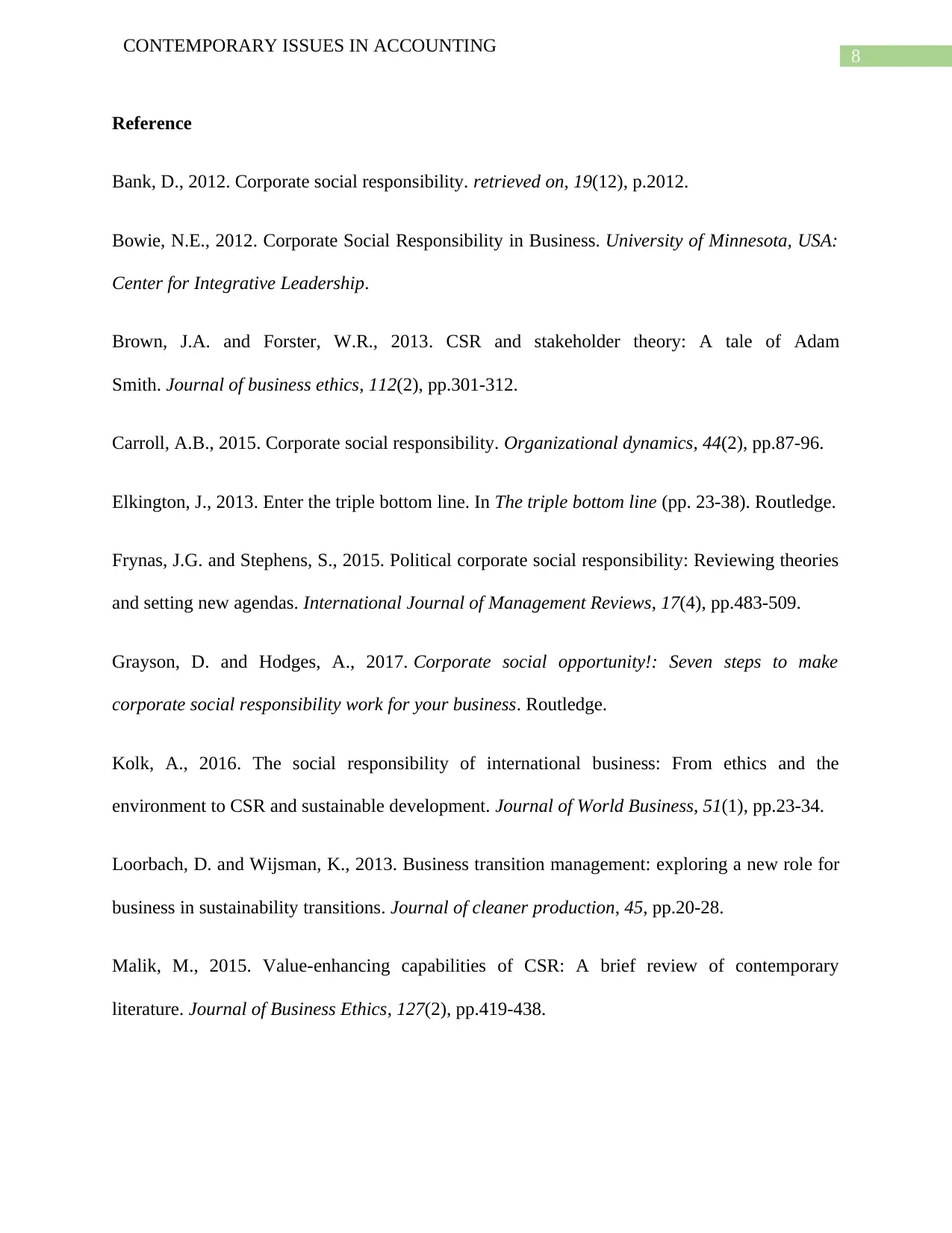
8
CONTEMPORARY ISSUES IN ACCOUNTING
Reference
Bank, D., 2012. Corporate social responsibility. retrieved on, 19(12), p.2012.
Bowie, N.E., 2012. Corporate Social Responsibility in Business. University of Minnesota, USA:
Center for Integrative Leadership.
Brown, J.A. and Forster, W.R., 2013. CSR and stakeholder theory: A tale of Adam
Smith. Journal of business ethics, 112(2), pp.301-312.
Carroll, A.B., 2015. Corporate social responsibility. Organizational dynamics, 44(2), pp.87-96.
Elkington, J., 2013. Enter the triple bottom line. In The triple bottom line (pp. 23-38). Routledge.
Frynas, J.G. and Stephens, S., 2015. Political corporate social responsibility: Reviewing theories
and setting new agendas. International Journal of Management Reviews, 17(4), pp.483-509.
Grayson, D. and Hodges, A., 2017. Corporate social opportunity!: Seven steps to make
corporate social responsibility work for your business. Routledge.
Kolk, A., 2016. The social responsibility of international business: From ethics and the
environment to CSR and sustainable development. Journal of World Business, 51(1), pp.23-34.
Loorbach, D. and Wijsman, K., 2013. Business transition management: exploring a new role for
business in sustainability transitions. Journal of cleaner production, 45, pp.20-28.
Malik, M., 2015. Value-enhancing capabilities of CSR: A brief review of contemporary
literature. Journal of Business Ethics, 127(2), pp.419-438.
CONTEMPORARY ISSUES IN ACCOUNTING
Reference
Bank, D., 2012. Corporate social responsibility. retrieved on, 19(12), p.2012.
Bowie, N.E., 2012. Corporate Social Responsibility in Business. University of Minnesota, USA:
Center for Integrative Leadership.
Brown, J.A. and Forster, W.R., 2013. CSR and stakeholder theory: A tale of Adam
Smith. Journal of business ethics, 112(2), pp.301-312.
Carroll, A.B., 2015. Corporate social responsibility. Organizational dynamics, 44(2), pp.87-96.
Elkington, J., 2013. Enter the triple bottom line. In The triple bottom line (pp. 23-38). Routledge.
Frynas, J.G. and Stephens, S., 2015. Political corporate social responsibility: Reviewing theories
and setting new agendas. International Journal of Management Reviews, 17(4), pp.483-509.
Grayson, D. and Hodges, A., 2017. Corporate social opportunity!: Seven steps to make
corporate social responsibility work for your business. Routledge.
Kolk, A., 2016. The social responsibility of international business: From ethics and the
environment to CSR and sustainable development. Journal of World Business, 51(1), pp.23-34.
Loorbach, D. and Wijsman, K., 2013. Business transition management: exploring a new role for
business in sustainability transitions. Journal of cleaner production, 45, pp.20-28.
Malik, M., 2015. Value-enhancing capabilities of CSR: A brief review of contemporary
literature. Journal of Business Ethics, 127(2), pp.419-438.
⊘ This is a preview!⊘
Do you want full access?
Subscribe today to unlock all pages.

Trusted by 1+ million students worldwide
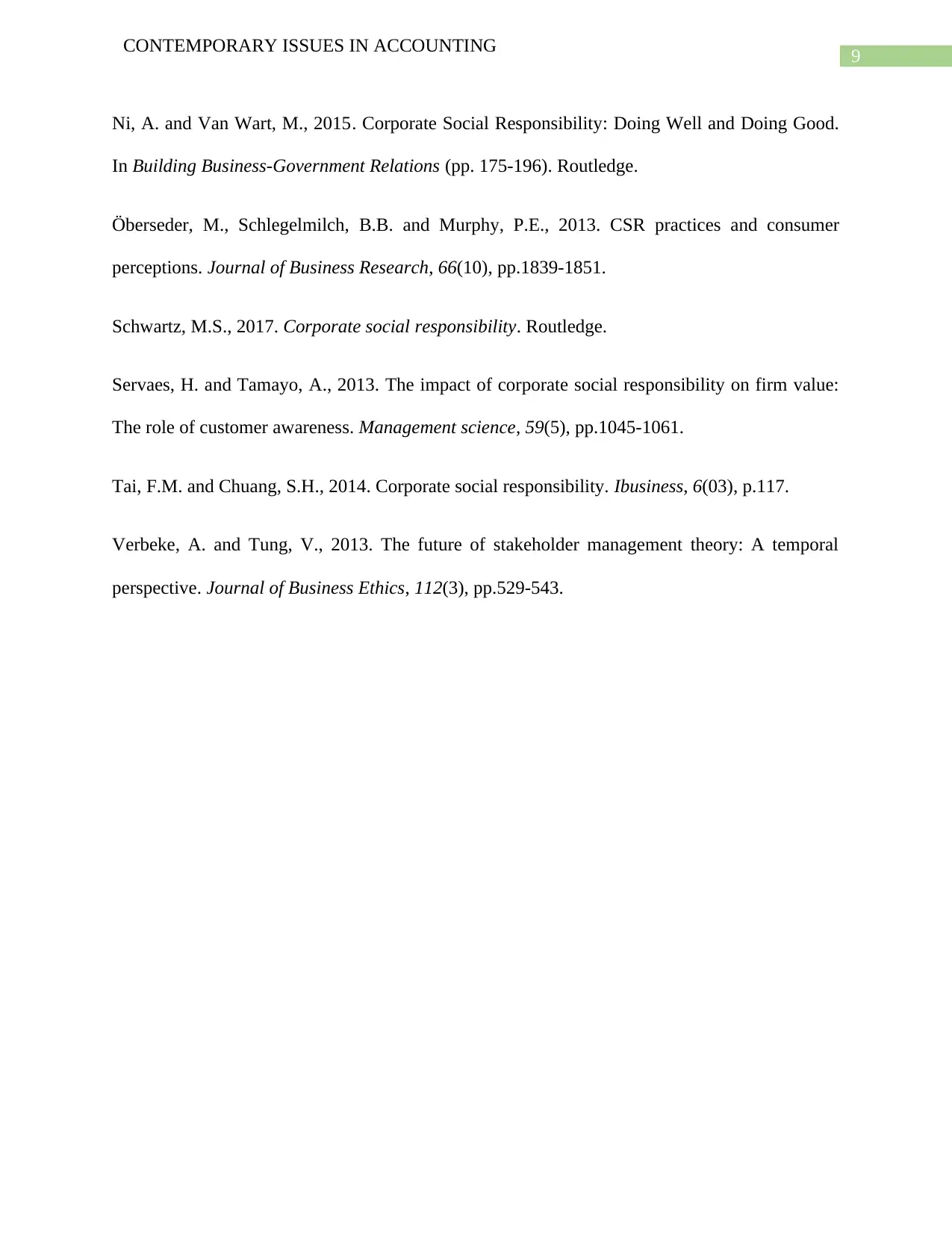
9
CONTEMPORARY ISSUES IN ACCOUNTING
Ni, A. and Van Wart, M., 2015. Corporate Social Responsibility: Doing Well and Doing Good.
In Building Business-Government Relations (pp. 175-196). Routledge.
Öberseder, M., Schlegelmilch, B.B. and Murphy, P.E., 2013. CSR practices and consumer
perceptions. Journal of Business Research, 66(10), pp.1839-1851.
Schwartz, M.S., 2017. Corporate social responsibility. Routledge.
Servaes, H. and Tamayo, A., 2013. The impact of corporate social responsibility on firm value:
The role of customer awareness. Management science, 59(5), pp.1045-1061.
Tai, F.M. and Chuang, S.H., 2014. Corporate social responsibility. Ibusiness, 6(03), p.117.
Verbeke, A. and Tung, V., 2013. The future of stakeholder management theory: A temporal
perspective. Journal of Business Ethics, 112(3), pp.529-543.
CONTEMPORARY ISSUES IN ACCOUNTING
Ni, A. and Van Wart, M., 2015. Corporate Social Responsibility: Doing Well and Doing Good.
In Building Business-Government Relations (pp. 175-196). Routledge.
Öberseder, M., Schlegelmilch, B.B. and Murphy, P.E., 2013. CSR practices and consumer
perceptions. Journal of Business Research, 66(10), pp.1839-1851.
Schwartz, M.S., 2017. Corporate social responsibility. Routledge.
Servaes, H. and Tamayo, A., 2013. The impact of corporate social responsibility on firm value:
The role of customer awareness. Management science, 59(5), pp.1045-1061.
Tai, F.M. and Chuang, S.H., 2014. Corporate social responsibility. Ibusiness, 6(03), p.117.
Verbeke, A. and Tung, V., 2013. The future of stakeholder management theory: A temporal
perspective. Journal of Business Ethics, 112(3), pp.529-543.
Paraphrase This Document
Need a fresh take? Get an instant paraphrase of this document with our AI Paraphraser
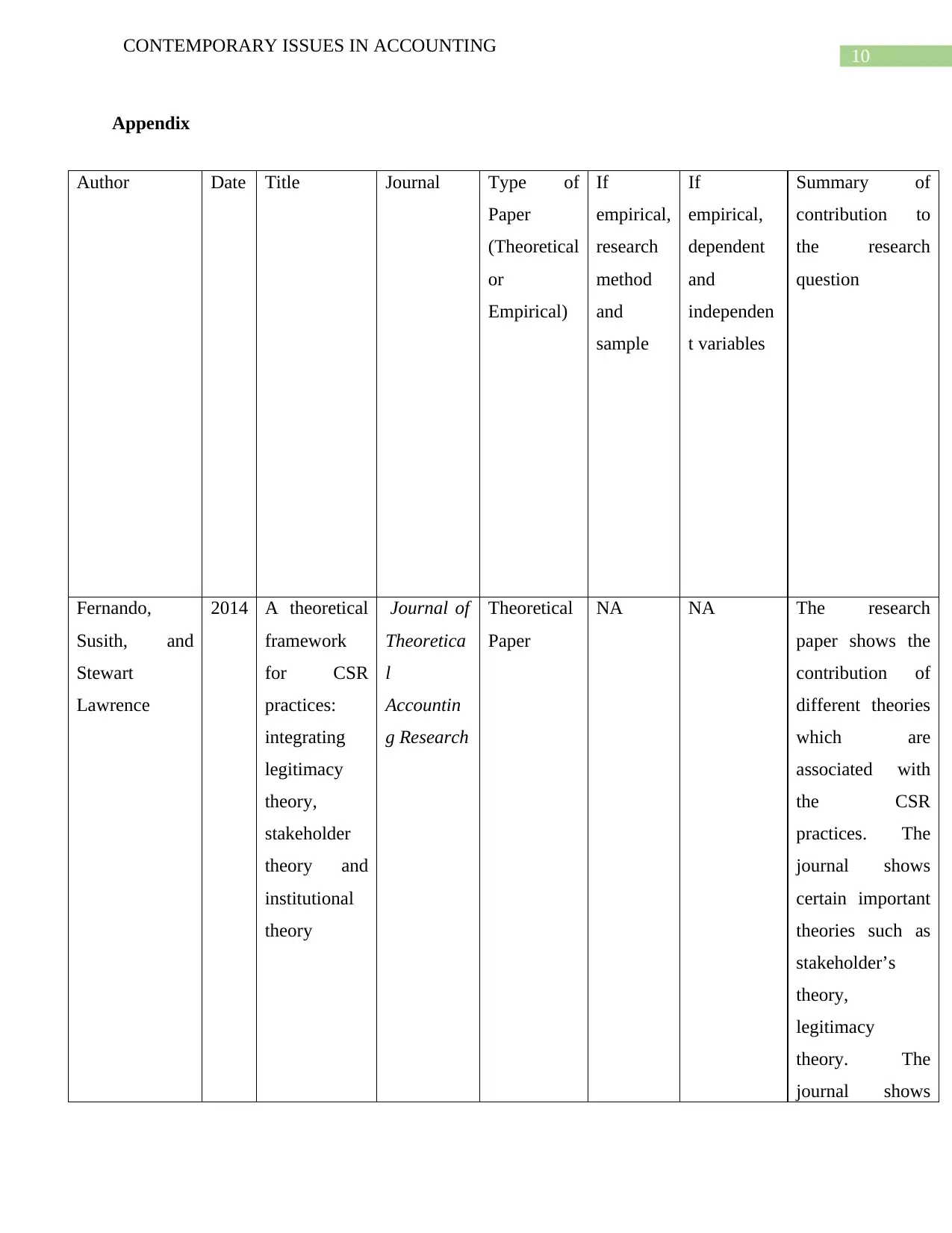
10
CONTEMPORARY ISSUES IN ACCOUNTING
Appendix
Author Date Title Journal Type of
Paper
(Theoretical
or
Empirical)
If
empirical,
research
method
and
sample
If
empirical,
dependent
and
independen
t variables
Summary of
contribution to
the research
question
Fernando,
Susith, and
Stewart
Lawrence
2014 A theoretical
framework
for CSR
practices:
integrating
legitimacy
theory,
stakeholder
theory and
institutional
theory
Journal of
Theoretica
l
Accountin
g Research
Theoretical
Paper
NA NA The research
paper shows the
contribution of
different theories
which are
associated with
the CSR
practices. The
journal shows
certain important
theories such as
stakeholder’s
theory,
legitimacy
theory. The
journal shows
CONTEMPORARY ISSUES IN ACCOUNTING
Appendix
Author Date Title Journal Type of
Paper
(Theoretical
or
Empirical)
If
empirical,
research
method
and
sample
If
empirical,
dependent
and
independen
t variables
Summary of
contribution to
the research
question
Fernando,
Susith, and
Stewart
Lawrence
2014 A theoretical
framework
for CSR
practices:
integrating
legitimacy
theory,
stakeholder
theory and
institutional
theory
Journal of
Theoretica
l
Accountin
g Research
Theoretical
Paper
NA NA The research
paper shows the
contribution of
different theories
which are
associated with
the CSR
practices. The
journal shows
certain important
theories such as
stakeholder’s
theory,
legitimacy
theory. The
journal shows
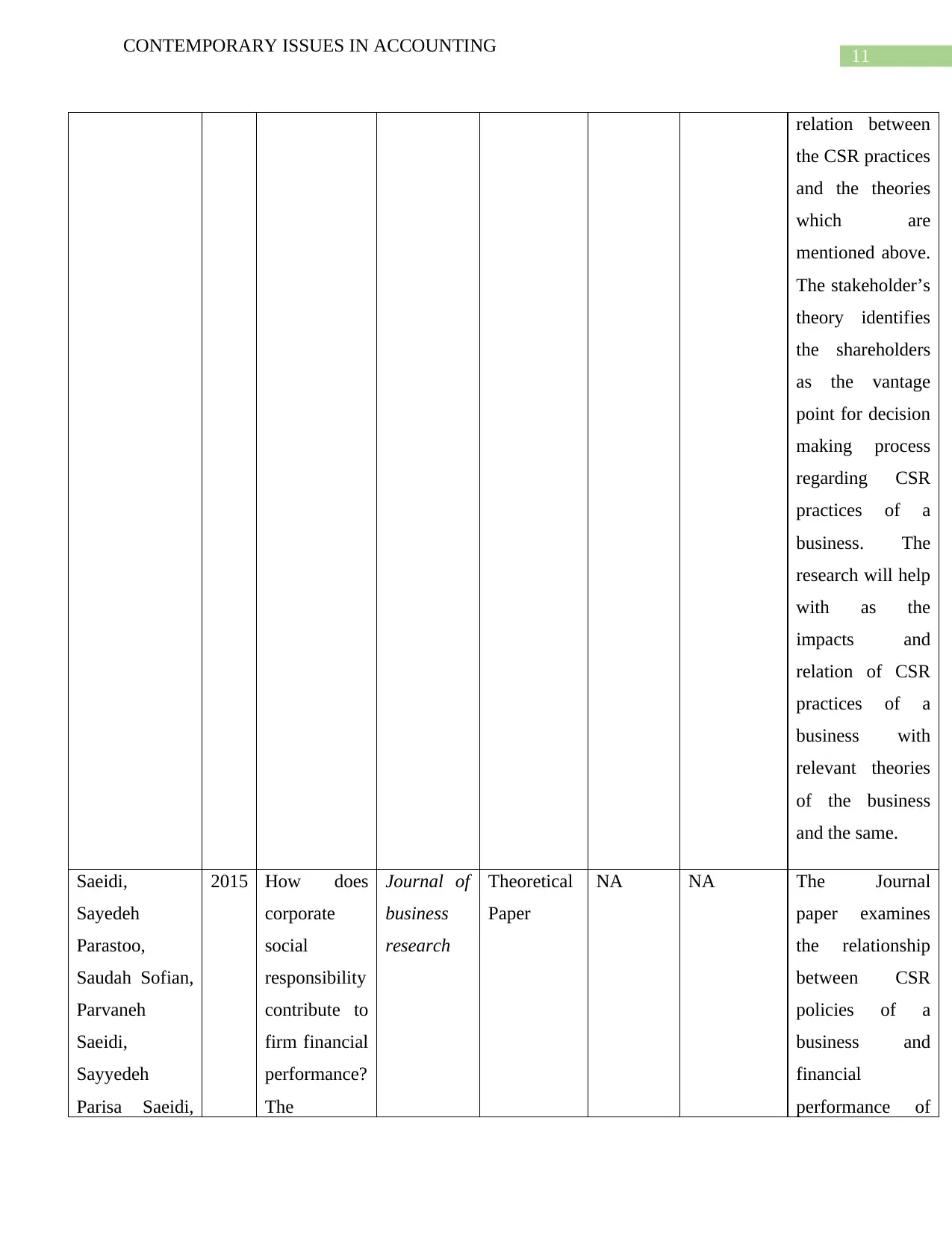
11
CONTEMPORARY ISSUES IN ACCOUNTING
relation between
the CSR practices
and the theories
which are
mentioned above.
The stakeholder’s
theory identifies
the shareholders
as the vantage
point for decision
making process
regarding CSR
practices of a
business. The
research will help
with as the
impacts and
relation of CSR
practices of a
business with
relevant theories
of the business
and the same.
Saeidi,
Sayedeh
Parastoo,
Saudah Sofian,
Parvaneh
Saeidi,
Sayyedeh
Parisa Saeidi,
2015 How does
corporate
social
responsibility
contribute to
firm financial
performance?
The
Journal of
business
research
Theoretical
Paper
NA NA The Journal
paper examines
the relationship
between CSR
policies of a
business and
financial
performance of
CONTEMPORARY ISSUES IN ACCOUNTING
relation between
the CSR practices
and the theories
which are
mentioned above.
The stakeholder’s
theory identifies
the shareholders
as the vantage
point for decision
making process
regarding CSR
practices of a
business. The
research will help
with as the
impacts and
relation of CSR
practices of a
business with
relevant theories
of the business
and the same.
Saeidi,
Sayedeh
Parastoo,
Saudah Sofian,
Parvaneh
Saeidi,
Sayyedeh
Parisa Saeidi,
2015 How does
corporate
social
responsibility
contribute to
firm financial
performance?
The
Journal of
business
research
Theoretical
Paper
NA NA The Journal
paper examines
the relationship
between CSR
policies of a
business and
financial
performance of
⊘ This is a preview!⊘
Do you want full access?
Subscribe today to unlock all pages.

Trusted by 1+ million students worldwide
1 out of 18
Related Documents
Your All-in-One AI-Powered Toolkit for Academic Success.
+13062052269
info@desklib.com
Available 24*7 on WhatsApp / Email
![[object Object]](/_next/static/media/star-bottom.7253800d.svg)
Unlock your academic potential
Copyright © 2020–2026 A2Z Services. All Rights Reserved. Developed and managed by ZUCOL.




